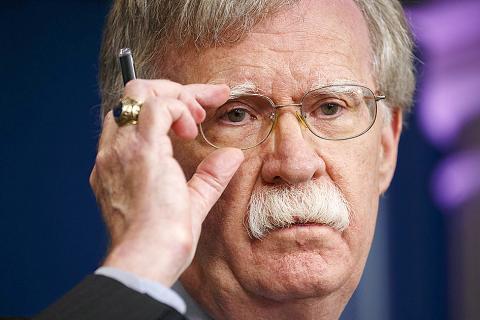Chinese provocations will not win Taiwanese hearts, but will only bring people around the world that cherish democracy closer, White House National Security Adviser John Bolton said in a tweet yesterday.
“Chinese military provocations won’t win any hearts or minds in Taiwan, but they will strengthen the resolve of people everywhere who value democracy. The Taiwan Relations Act [TRA] and our commitment are clear,” Bolton wrote.
Bolton did not elaborate on the US’ commitment to Taiwan.

Photo: Bloomberg
According to the TRA, which serves as the basis of unofficial relations between Taiwan and the US, Washington is obliged to provide Taiwan with defensive weapons.
It must also “maintain the capacity of the United States to resist any resort to force or other forms of coercion that would jeopardize the security, or the social or economic system, of Taiwan’s people,” the act says.
Minister of Foreign Affairs Joseph Wu (吳釗燮) thanked Bolton for his “unwavering friendship and support” in a tweet.
“We’re determined to deal with any reckless military adventure by the bully across the #Taiwan Strait. Provocation only makes us stronger & as you said: ‘Surrender is not an option,’” Wu wrote.
Bolton’s comments came after two Chinese People’s Liberation Army Air Force fighter jets crossed the median line of the Taiwan Strait on Sunday, a rare move that breached a long-held tacit agreement between the two sides.
Military sources said it was the first time since 1999 that the Chinese military had intentionally crossed the median line that separates Taiwan and China.
Commenting on the incident, Pentagon spokesman Lieutenant Colonel Dave Eastburn said the US opposes unilateral actions by any party aimed at altering the cross-strait “status quo,” including “any resort to force or other forms of coercion.”
“Consistent with the Taiwan Relations Act, the United States considers any effort to determine the future of Taiwan by other than peaceful means, including by boycotts or embargoes, of grave concern to the United States,” he said.
The Ministry of National Defense said that the air force scambled five fighter jets to intercept two Chinese J-11 fighter planes that crossed the median line and entered Taiwan’s southwestern airspace at 11am on Sunday.
The J-11 aircraft eventually returned to the Chinese side of the median line after receiving multiple radio warnings.
Ian Easton, a research fellow with the US-based think tank Project 2049 Institute, said the provocation was “further evidence that [Chinese President] Xi Jinping (習近平) is an aggressive and ambitious militarist.”
He said it was a good sign that Washington is beginning to realize Beijing’s threat to Taiwan and to the whole Indo-Pacific region.

MORE VISITORS: The Tourism Administration said that it is seeing positive prospects in its efforts to expand the tourism market in North America and Europe Taiwan has been ranked as the cheapest place in the world to travel to this year, based on a list recommended by NerdWallet. The San Francisco-based personal finance company said that Taiwan topped the list of 16 nations it chose for budget travelers because US tourists do not need visas and travelers can easily have a good meal for less than US$10. A bus ride in Taipei costs just under US$0.50, while subway rides start at US$0.60, the firm said, adding that public transportation in Taiwan is easy to navigate. The firm also called Taiwan a “food lover’s paradise,” citing inexpensive breakfast stalls

TRADE: A mandatory declaration of origin for manufactured goods bound for the US is to take effect on May 7 to block China from exploiting Taiwan’s trade channels All products manufactured in Taiwan and exported to the US must include a signed declaration of origin starting on May 7, the Bureau of Foreign Trade announced yesterday. US President Donald Trump on April 2 imposed a 32 percent tariff on imports from Taiwan, but one week later announced a 90-day pause on its implementation. However, a universal 10 percent tariff was immediately applied to most imports from around the world. On April 12, the Trump administration further exempted computers, smartphones and semiconductors from the new tariffs. In response, President William Lai’s (賴清德) administration has introduced a series of countermeasures to support affected

CROSS-STRAIT: The vast majority of Taiwanese support maintaining the ‘status quo,’ while concern is rising about Beijing’s influence operations More than eight out of 10 Taiwanese reject Beijing’s “one country, two systems” framework for cross-strait relations, according to a survey released by the Mainland Affairs Council (MAC) on Thursday. The MAC’s latest quarterly survey found that 84.4 percent of respondents opposed Beijing’s “one country, two systems” formula for handling cross-strait relations — a figure consistent with past polling. Over the past three years, opposition to the framework has remained high, ranging from a low of 83.6 percent in April 2023 to a peak of 89.6 percent in April last year. In the most recent poll, 82.5 percent also rejected China’s

PLUGGING HOLES: The amendments would bring the legislation in line with systems found in other countries such as Japan and the US, Legislator Chen Kuan-ting said Democratic Progressive Party (DPP) Legislator Chen Kuan-ting (陳冠廷) has proposed amending national security legislation amid a spate of espionage cases. Potential gaps in security vetting procedures for personnel with access to sensitive information prompted him to propose the amendments, which would introduce changes to Article 14 of the Classified National Security Information Protection Act (國家機密保護法), Chen said yesterday. The proposal, which aims to enhance interagency vetting procedures and reduce the risk of classified information leaks, would establish a comprehensive security clearance system in Taiwan, he said. The amendment would require character and loyalty checks for civil servants and intelligence personnel prior to